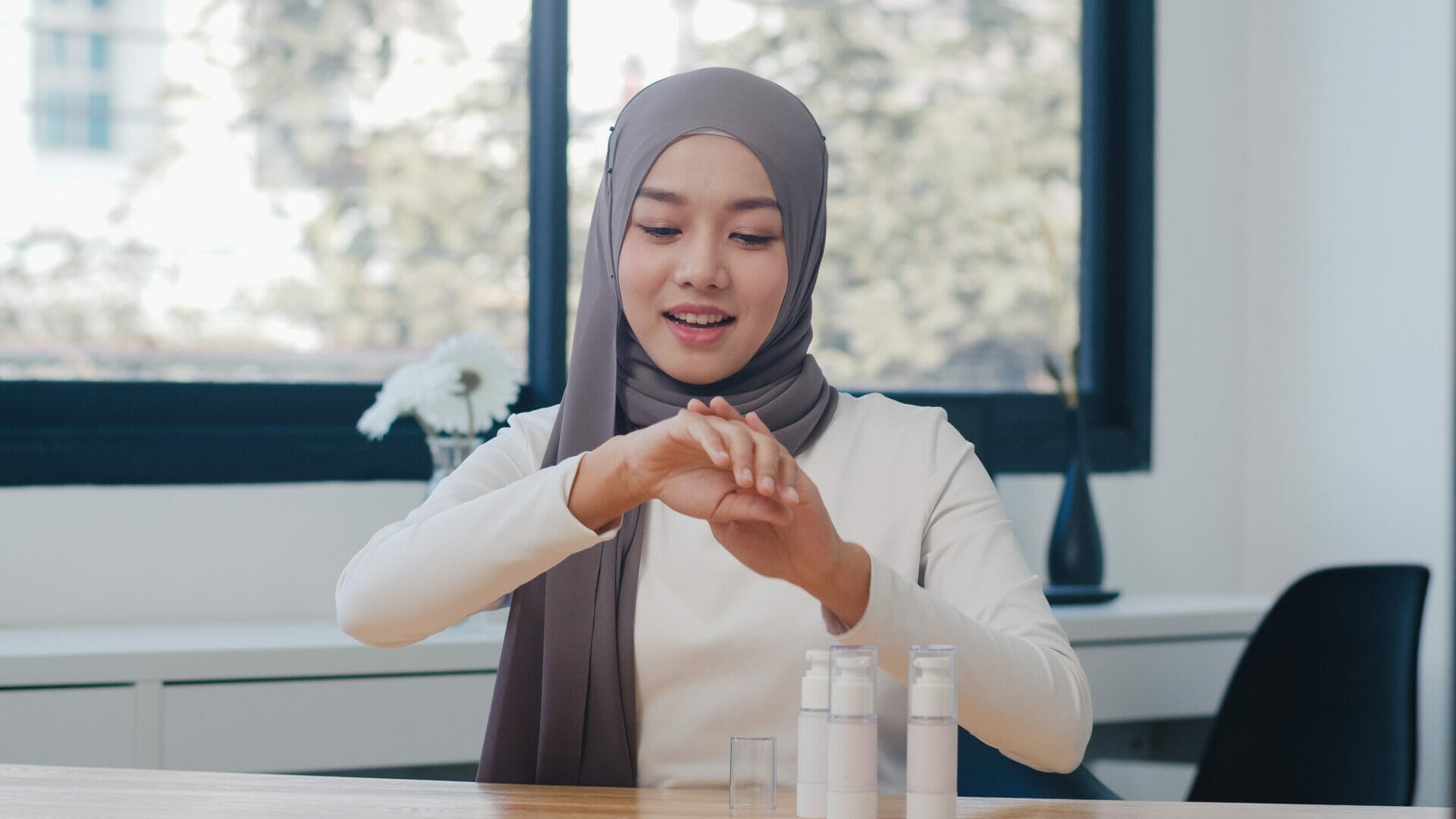The halal beauty industry is a rapidly growing market that’s becoming more and more popular. In 2020, the total value of halal beauty products worldwide was about $74.7 billion.
And experts believe that it will keep growing at a really fast rate of around 19.97% each year between 2020 and 2027.
This means more and more people are interested in buying halal beauty products, and businesses are taking advantage of this trend to sell these products.
What Is Halal Beauty?
Halal beauty products are beauty products that are made following the rules of Islamic law. To get certified as halal, these products have to meet specific criteria.
First, they can’t contain any animal-derived substances, alcohol, blood, or harmful ingredients. The ingredients should be alcohol-free, although a tiny amount (up to 0.5%) may be allowed in some cases. If animal-derived ingredients are used, they need to be certified as halal.
For water-resistant cosmetics like nail polish, the ingredients must be permeable by water so that when someone needs to perform ablution (a cleansing ritual), the water can reach the skin or nail bed underneath the makeup.
To maintain the halal standards, cosmetics manufacturers must ensure hygiene and cleanliness throughout the whole process of making, processing, preparing, transporting, and storing the halal cosmetics.
This ensures that the products are in line with Islamic requirements and can be used by people who prefer halal products for their lifestyle and beliefs.
The Demand for Halal Cosmetics Is Growing
The halal beauty industry is a very competitive and profitable market that’s constantly evolving. Southeast Asia is the biggest producer of halal cosmetics, accounting for about 40% of the market.
The Middle East has a 12% market share in sales, while the USA and Europe have a smaller share of about 4%. Overall, the global halal cosmetics market is worth around $2.5 billion and is growing at a rate of 5.6% each year.
According to a report, Muslims spent about $61 billion on cosmetics in 2017, and this spending is expected to increase to $90 billion by 2023. This growth is driven by the expanding availability of halal-certified products in the pharmaceutical and cosmetics sectors.
In countries like Indonesia and Malaysia, where the majority of the population is Muslim, the demand for halal beauty products is high.
In 2023, the beauty and personal care industry in Indonesia is expected to grow by around 10%, while in Malaysia, it is expected to grow by 15%. This will lead to an increase in the proportion of halal beauty products on the market.
The popularity of halal beauty products in Indonesia has been increasing, with the percentage of halal beauty products growing from 2.7% to 7.1% between 2019 and 2022.
Additionally, new halal beauty brands founded by celebrities, such as SimplySiti by Malaysian singer Dato Sri Siti Nurhaliza, have been well-received by consumers. This indicates a positive trend for new businesses in the halal beauty industry, especially in Southeast Asia.
Halal Products Are Quality Products for Everyone
Halal beauty products focus on being transparent about their ingredients, ensuring they are safe and meet halal standards.
In Malaysia, to be halal certified, beauty products need approval from the Department of Islamic Development Malaysia (JAKIM). They follow specific guidelines and undergo inspection before getting certified.
The demand for ingredient transparency is not just limited to Muslim consumers. Many non-Muslims also prefer brands that prioritize transparency, providing detailed information about their ingredients.
Halal beauty is gaining popularity because it offers comprehensive ingredient lists without potentially harmful substances, making it easier for consumers to make informed choices.
As more people worldwide seek cruelty-free, vegan, and halal beauty products, the industry is expected to grow even more. This indicates a promising future for the market, and the global interest in halal beauty shows that consumers are willing to spend on products that align with their religious beliefs.
All in All
The cosmetics market in Southeast Asia is well developed compared to other regions because consumers here are more informed about the products they use, and there are specific regulations for halal cosmetics, especially in countries like Malaysia and Indonesia.
Muslim beauty, also known as M-beauty, is becoming more prominent and is expected to be the next big trend after K-beauty. The increasing popularity of halal cosmetics is playing a significant role in this growth.
Large cosmetics manufacturers, including cosmetics contract manufacturers and OEM cosmetic manufacturers, are showing more interest in developing halal formulations, which is contributing to the strong growth and development of halal beauty products.
As the demand for halal beauty continues to rise, it’s likely that we’ll see even more exciting developments and innovations in the M-beauty industry in the future. This presents a great opportunity for businesses and consumers alike in the region and beyond.


